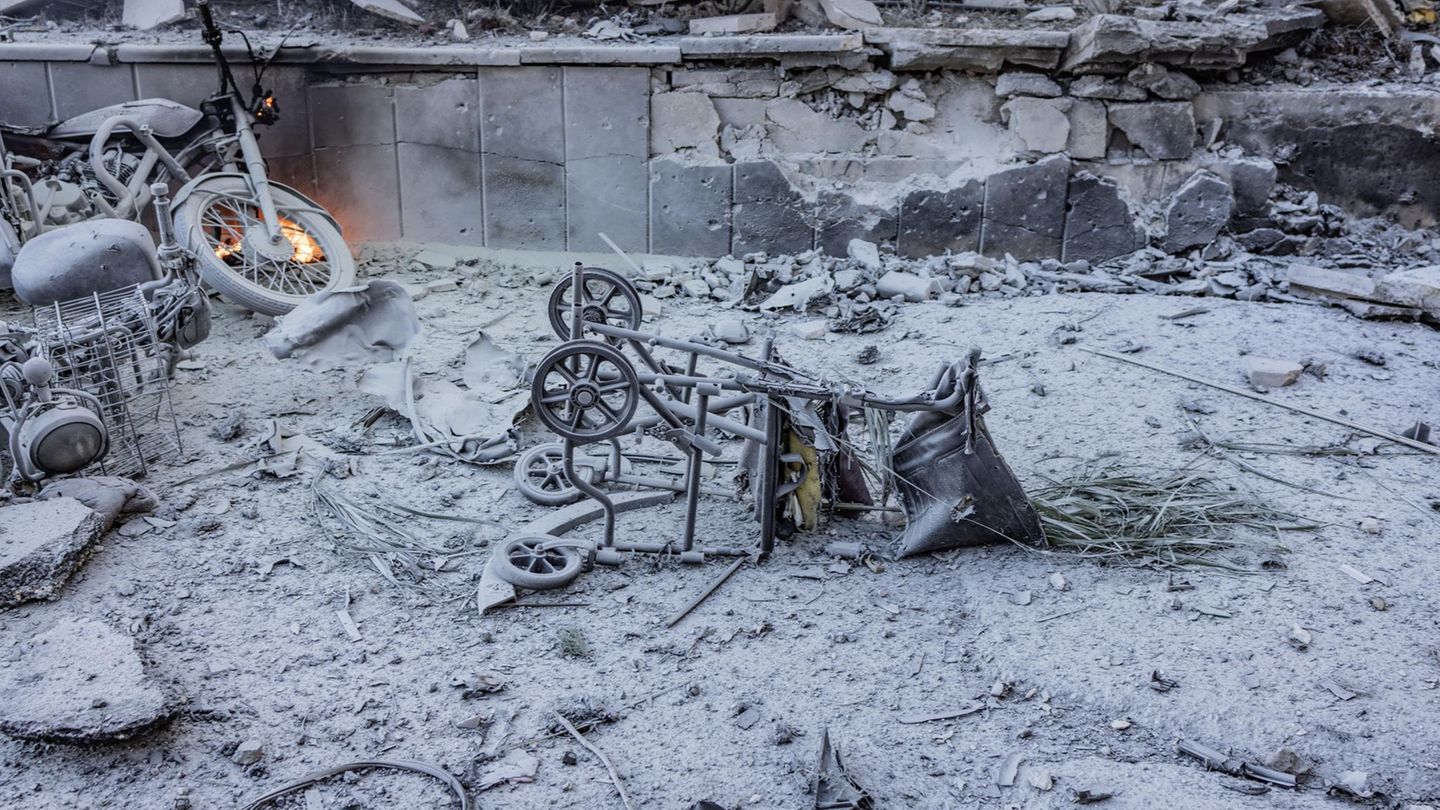Civil war country
These are the different positions in the Syria war
Copy the current link
Rebels and government troops are engaged in bloody battles in Syria. Who pursues which interests and what is at stake for ruler Assad?
After years without any major fighting in the Syrian civil war, the conflict flared up again in the course of a week. An alliance of actually rival rebels has surprisingly quickly taken over large areas in the northwest and, after fighting for Aleppo and Hama, is now advancing towards Homs. A decisive battle could take place there with potentially serious consequences for President Bashar al-Assad.
The conflict in Syria began in 2011 with protests against Assad’s government. Security forces responded with violence. Everything resulted in a civil war with international participation, in which Russia, Iran, Turkey and the USA pursued their own interests. Around 14 million people were displaced. According to UN estimates, more than 300,000 civilians have died so far. A political solution has not been in sight for years.
Syria’s ruler Assad has been significantly weakened
The rebels’ surprisingly quick offensive revealed “embarrassing weaknesses in the Assad regime’s defense,” writes Hamidreza Azizi from the Foundation for Science and Politics in the magazine “Foreign Policy.” The rebel alliance has become significantly more important and Assad and his regime are deeply weakened, writes Syria expert Charles Lister.
Assad’s military influence has so far relied primarily on the support of his allies. With the help of the Russian Air Force, fighters from the pro-Iranian Hezbollah and Iranian Revolutionary Guards, Assad recently regained control over two-thirds of the divided country. Whether he can hold on to power in the long term will also depend on the behavior of Moscow and Tehran.
Assad’s most important supporters are busy with their own problems: Russia with the war in Ukraine, Hezbollah and its supporter Iran with severe setbacks in the war against Israel. Almost the entire Hezbollah leadership and a large number of its fighters were killed.
HTS plans to overthrow Assad
The Islamist group Haiat Tahrir al-Sham (HTS), which dominates the northwest and is leading the offensive, is planning to overthrow Assad. By taking the megacity of Aleppo, the rebels gained control of the country’s economic center.
HTS followed an earlier offshoot of the terrorist organization Al-Qaeda in Syria, but has distanced itself from it as well as from the terrorist militia Islamic State (IS). The group is now considered somewhat more moderate than IS or the Afghan Taliban. She has also stated that she wants to respect minorities and other religions.
At its core, however, it is an authoritarian armed group that has been accused in recent years of, among other things, torture, other forms of violence and the expulsion of minorities. The USA, the EU and the United Nations, among others, classify HTS as a terrorist organization.
Turkey could end up benefiting
Turkey denies having anything to do with the offensive. However, observers in the country assume that Ankara has at least approved the move – and will ultimately benefit from it. Turkey supports the Syrian National Army (SNA) in the civil war and, with their support, occupies border areas in the north. According to military expert Erdogan Karakus, the Islamist HTS is coordinating with the SNA rebels. In addition, Turkey regularly delivers aid to Idlib and definitely has an influence on what is happening.
Turkish President Recep Tayyip Erdogan has two main goals in Syria: On the one hand, he wants at least some of the refugees in his country to return to Syria. On the other hand, he wants to weaken the influence of Kurdish militias on the border. There he is planning a so-called “security corridor” to settle refugees and push back the Kurdish militias.
Turkey is probably not interested in a “dramatic escalation,” says Heiko Wimmen from the International Crisis Group think tank to the DPA news agency. “Ankara may not be reluctant to see the rebels improve their position. That brings advantages if you want to negotiate with Assad about “normalization.” However, an expansion of the conflict, which ultimately brings Russia back into the picture, seems rather counterproductive .”
Neighbor Israel sees developments with mixed feelings
Analysts at the Institute for National Security (INSS) think tank in Tel Aviv write that from an Israeli perspective, developments in Syria have both positive and negative aspects. On the one hand, Assad’s side has been hit hard and his fall would be a significant blow to Iran and its accomplices and to Russia. “Iran would have to withdraw its troops from Syria, while the direct route for Hezbollah’s military reconstruction would be blocked by arms smuggling from Iran and Syria to Lebanon,” the analysts said.
On the other hand, if Assad is overthrown, there is a risk of chaos and instability in the region. Particularly worrying is the possibility “that jihadist groups – even if they are somewhat more moderate – could take control of large parts of Syria and a potentially large arsenal of weapons, including chemical weapons, and thus pose a serious threat to Israel.” . The question therefore arises as to whether “the devil we know” (Assad) is preferable or not.
Iran wants to consider sending troops
A change of power in Syria or even the fall of Assad would have serious consequences for the Iranian leadership. The alliance with Syria as a “corridor” to the Mediterranean has so far been central for the Islamic Republic to supply weapons to Hezbollah in Lebanon and strengthen regional influence. Syria – like other militant groups – is considered part of the so-called resistance axis in the fight against Israel.
Foreign Minister Abbas Araghchi said he would examine possible troop deployments if the Syrian government requests it. Iran has already sent a notorious commander to the civil war country. The delegation, led by General Jawad Ghafari, an expert on Syria, is intended to support the government troops’ counteroffensive. Ghafari became known as the “Butcher of Aleppo” for his role in the recapture of Aleppo in 2016, the US Institute for War Studies (ISW) reported.
The further course will also depend on the new US government under Donald Trump, who will be sworn in on January 20, 2025. Trump ordered airstrikes in Syria during his first term in office. He could also enforce a hard line against Iran and its allied ruler Assad in the new year.
DPA
km; Amira Rajab, Mirjam Schmitt, Sara Lemel and Arne Bänsch
Source: Stern
I have been working in the news industry for over 6 years, first as a reporter and now as an editor. I have covered politics extensively, and my work has appeared in major newspapers and online news outlets around the world. In addition to my writing, I also contribute regularly to 24 Hours World.




